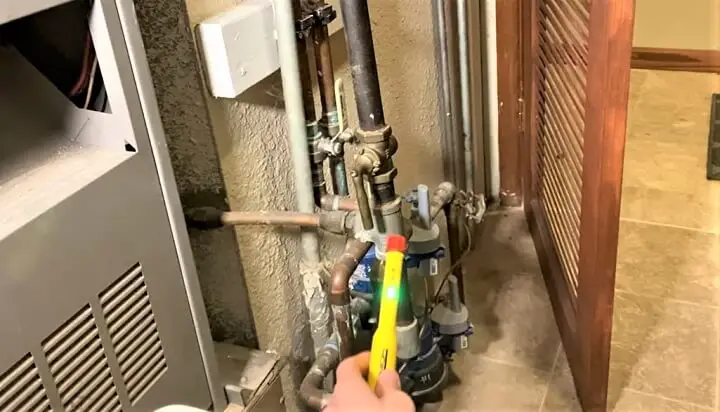Note: This article may contain affiliate links, which means if you make a purchase following our links won’t cost you extra, but we may earn a commission. Learn more
Can Natural Gas Leaks Make You Sick?
Natural gas is odorless, colorless, and tasteless. So, how can you tell if there’s a gas leak in your home? And, more importantly, can those gas leaks make you sick?
The first thing you might notice is a hissing sound coming from your stove, furnace, water heater, or another gas appliance. You might also see a flickering flame on your stovetop or water that won’t get hot. If you have a gas leak, you might smell a sulfuric “rotten egg” smell.
Exposure to natural gas can cause a number of short- and long-term health effects, including headaches, dizziness, nausea, and vomiting. In extreme cases, it can lead to asphyxiation (lack of oxygen) and even death.
If you think you have a gas leak, it’s important to leave the house immediately and call your gas company or 9-1-1. Don’t turn any lights on or off, and don’t use your phone until you’re outside. Once you’re safe, the gas company will be able to shut off the gas and make any necessary repairs.

What are the Symptoms of Gas Leak in Home?
If you believe you have a gas leak in your home, it is important to take immediate action to ensure the safety of yourself and your family. The first step is to evacuate the premises and then call your local gas company or emergency services. There are several symptoms that may indicate a gas leak in your home, which include:
1. Smelling Rotten Eggs
If you smell a faint, sulfur-like odor, it could be a natural gas leak. The natural gas used in homes is odorless, but gas companies add a chemical called mercaptan to give it a distinct smell. If you think you smell gas, open all the doors and windows to ventilate the area, then leave immediately and call the gas company.
2. Hissing or Whistling Sounds
If you hear a hissing or whistling noise near a gas appliance, it could be a sign that the appliance isn’t functioning properly and needs to be repaired or replaced. If you hear this noise coming from a pipe, it could be a sign of a gas leak.
3. Unusual Flames
If you see unusually high or flickering flames from your gas stovetop burners, it could be a sign that the burner orifice is the wrong size for the type of gas you have. This can cause the gas to escape and could be a fire hazard. If you see unusual flames, call a qualified technician to check your appliance.
4. Soap Bubble Test
If you suspect a gas leak but can’t find the source, you can do a “soap bubble test.” Turn off all gas appliances in your home, then go outside and find the main gas shut-off valve. Turn the valve until it’s perpendicular to the pipe (in the “off” position). Then, using dish soap and water, make a soapy solution and apply it to all the gas piping joints in your home. If you see any bubbles forming, it’s a sign of a gas leak.
5. Increased Utility Bills
If your gas bill suddenly increases and you can’t explain the reason, it could be because of a gas leak. If you have an old home with outdated appliances, they may not be operating as efficiently as newer models and could be using more gas than necessary. But if you have new appliances and your gas bill goes up for no apparent reason, it could be because of a gas leak.
6. Hearing a Hissing Noise
If you hear a hissing noise coming from your stove, this is a sure sign of a gas leak. The hissing noise is produced when the gas escapes through a small opening.
7. Smelling Gas
If you smell gas, this is another sure sign that there is a gas leak in your home. Gas is odorless, so the smell is actually from an additive called mercaptan. This additive is added to gas so that people can smell it in case of a leak.
What Does Gas Poison Feel Like?
When someone is poisoned by gas, they may feel a burning sensation in their throat or chest. They may also have trouble breathing, and their skin may turn red or purple. Gas poisoning can be fatal if not treated immediately.
Related: Is Natural Gas an Alternative to Fossil Fuels?
Can Natural Gas Fumes Hurt You?
Natural gas fumes are dangerous and can hurt you if inhaled. Natural gas is made up of methane and other chemicals, which can be harmful if breathed in. Symptoms of inhaling natural gas fumes include headache, dizziness, nausea, vomiting, and difficulty breathing.
If you think you have been exposed to natural gas fumes, it is important to get fresh air immediately and call your local poison control center or emergency room.

How to Detox from Natural Gas Poisoning
If you think you may have been poisoned by natural gas, it is important to seek medical attention immediately. In the meantime, there are some things you can do to help detox your body.
Drink lots of fluids: Water will help to flush the toxins out of your system. You can also drink herbal teas and juices.
Get some rest: Take a break from work or other activities and get some rest. Your body needs time to heal.
Eat healthy foods: Eating nutritious foods will help your body to recover more quickly. Choose foods that are high in vitamins and antioxidants, such as fruits and vegetables. Avoid processed foods and sugary drinks.
Exercise: Light exercise will help to improve circulation and promote detoxification through sweating. However, if you feel too weak or dizzy, it’s best to rest instead.
Symptoms of Natural Gas Poisoning from Stove
If you suspect that you or someone in your home has been poisoned by natural gas from a stove, it is important to be aware of the symptoms and get medical help immediately. Natural gas is odorless and colorless, so the first symptom may be dizziness or headaches. Other symptoms include nausea, vomiting, shortness of breath, and confusion.
If you experience any of these symptoms after using a gas stove, leave the house immediately and call 911.
Slow Gas Leak Symptoms
A gas leak is a serious problem that can lead to a fire or explosion. It is important to be familiar with the symptoms of a gas leak so that you can take action to prevent it from happening. The most common symptom of a gas leak is the smell of natural gas.
Natural gas is odorless, so an additive called mercaptan is added to it so that people can detect when there is a leak. If you smell mercaptan, it is important to leave the area immediately and call your utility company or 911. Other symptoms of a gas leak include:
- Hissing or whistling sounds near natural gas appliances or pipes
- Dirty stains on walls or floors near appliances or pipes
- Dead houseplants
- Bubbling in standing water
If you experience any of these symptoms, you should leave the area immediately and call your utility company or 911.
Conclusion
If you’re like most people, you probably think of natural gas as being relatively harmless. After all, it’s the stuff that powers our stoves and furnaces, and it’s been used safely for centuries.But the truth is that natural gas can be very dangerous if it leaks into your home.
That’s because it can displace the oxygen in the air and cause suffocation. It can also cause explosions if there’s enough of it in an enclosed space.So what are the signs of natural gas poisoning?
The most common symptom is headaches, but you might also experience dizziness, nausea, shortness of breath, or confusion. If you start to feel any of these symptoms, get out of your house immediately and call your gas company.